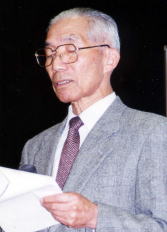No.183
Think About Peace Now Shigeo Tajima Advisor to Meguro UNESCO
1 How Japanese People Thought of Peace Immediately After the World War
II
Their white mufflers remain in my eyes,
Young pilots, who flew away
Toward never a returning journey. (Yukio Kondo)
Cape Kiya, from where women jumped into the ocean,
Only a monument stands still
Hearing the sound of waves. (Naoko Iwai)
When someone talks about my brother,
Who never came back from the war,
Father leaves his seat without a word. (Ayako Miura)
My father, named me Sachiko wishing me to be blessed with happiness,
Went to the war and never came back,
His last place is still unknown. (Sachiko Yokosuka)
A s the one who survived through the war,
I will be living keeping high the light of peace. (Yoko Someya)
These poems were taken from the "Manyoshu For Peace", which
so well reflect the minds of the Japanese people right after the World
War II. As you see, Japanese people have grieved, looked back, hated the
war, and wished to construct world peace. So we declared, through the constitution
of Japan, to prohibit war as a resolution of international conflicts, and
also to prohibit the possession of military power. At the same time, the
UN, international organizations and NGOs made it their mandate to prevent
war, and started to construct international systems for the world peace.
2 Regardless of the Japanese people's wish and the efforts of the international
community, the conflicts between East and West became serious and eventually
developed into the Cold War. The extent of the Cold War can be seen, for
example, in the Berlin Blockade in 1949 and the Civil War in China, which
was followed by the Korean War. When the battle came down the Korean Peninsula
to Pusan, Japan started preparing a self-defense system. They established
the Police Preparation Force, which was later converted into the Self Defense
Force of Japan when the Japan-U.S. Security Treaty was concluded. How should
we think of these issues? Did we abandon idealism? Was it a realistic response?
Or were denying war and being unarmed unrealistic dreams from the beginning?
We have to think of this sincerely now.
3 Wars for independence and ensuing domestic conflicts often extended
the Cold War, or 'wars by proxy' that often brought bogged-down situations.
Also, territorial conflicts broke out. First, the Middle East War began,
which has been followed by numerous conflicts between Israel and Palestinian
countries ever since. You cannot forget the three Indo-Pakistan Wars over
the Kashmir region. Then, the world faced the Gulf War. The ending of the
Cold War gave people hope and a longing for freedom, but it also resulted
in conflicts over ethnicity and religion. We already know what happened
in the Bosnia-Herzegovina and Kosovo conflicts in the former Yugoslavian
countries. And now we are facing revenge attacks against Afghanistan following
the September 11 terrorist attack on New York and Washington D.C. This
incident reminds us of the struggle between civilizations.
4 The UN and other international organizations have been making efforts
to conclude treaties and establish world systems. These directly help to
prevent wars and brutal killings, and indirectly in the mid- and long-term,
help pursue the welfare and happiness of human beings. These efforts include
disarmament, nuclear test-bans, nuclear nonproliferation, strategic arms
reduction, ban of biological/chemical weapons and anti-personnel mines,
registration system for exporting weapons, and PKO (Peace Keeping Operations).
Those efforts have been made through programmes such as the UN Environmental
Plan, Prevention of Global Warming, Literacy Education, Registration of
World Heritage, Respect of the Human Rights of Women and Children, WTO,
etc.
5 Although various policies have been carried out, helping to prevent wars
and promote the welfare of human beings, their impact is still too weak
to completely stop the energy that leads people to war. This applies not
only to the Middle East, Africa, Indian Continent and other places located
far from us. Conflicts might happen involving Japan, too, even tomorrow.
North Korea has already launched missiles into the Pacific Ocean flying
over Japanese Islands. China, eager to get oil and leadership in Asia,
has also launched missiles into the sea not far from the Taiwanese shore.
To promote UNESCO Movements, we must recognise and understand political
tensions in the world. But at the same time, we should not forget what
we have done to establish a way to achieve world peace. That way starts
from international understanding and leads on to international cooperation
and solidarity. I know this is a hard way to proceed but, I believe, is
not too hard to overcome.
The public relations committee is now editing the lectures to be seen on
our website.